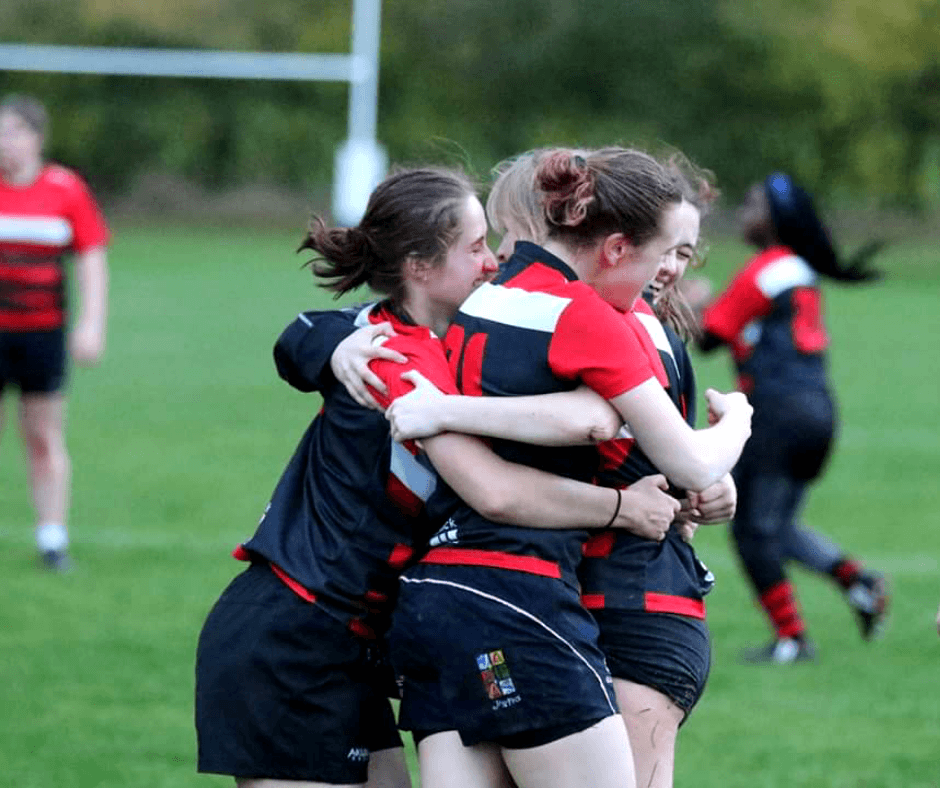Fight for equality continues after Canterbury’s #IAmEnough apology
Sports clothing manufacturers Canterbury of New Zealand issued an apology on Thursday 27 August after coming under fire for not using female players to promote their new line of Irish rugby jerseys. The promotional photos used in the kit launch showed three beaming IRFU men’s players (Bundee Aki, Robert Henshaw and Conor Murray), alongside three super-imposed models in women’s kit.
Wasps’ Ladies player Florence Williams was quick to point out the lack of representation for women’s players on Twitter, saying: “an opportunity to build recognition, fan bases & creating female role models for future generations is lost”.
Since then, the IAmEnough hashtag has trended on social media, accompanied by photos of women’s rugby players and teams, from grassroots to professional. It is intended to bring greater recognition to female players of the sport, who make up 25% of all players.
The brand has encouraged the spread of #IAmEnough on Twitter
In response, Canterbury quickly apologised for the blunder: “While the image was primarily designed for our website, which also features male models, it has understandably caused some frustration. We accept that this was an error and apologise for any upset caused.”
The image of models wearing the women’s kit on the front page of their website has since been taken down. Canterbury claim they were unable to have IRFU female players model the kit in time for the line’s launch but promise that the amended promotional photos will be ready by October.
The brand has encouraged the spread of #IAmEnough on Twitter. It has also pledged to photograph both male and female rugby players for all its campaigns in future and work to tackle inequalities in the sport.
Canterbury’s decision to launch their new jersey line without waiting to model female players demonstrates two clear issues with how the women’s game is viewed.
The first issue is that female sports players in general are overlooked – sport is still seen as more of a masculine pursuit. In the interest of meeting a deadline, Canterbury’s marketing team decided the IRFU’s male players were better-known than the female ones, therefore not enough people would care about the lack of female representation. It never would have happened the other way around.
Such limited broadcasting only serves to reinforce the current barriers for young girls
This reflects a wider problem in women’s sport – the lack of coverage. The most recent statistics date back to a study of the market between 2011-2013, which found that women’s sport accounted for a measly 0.4% of global sports sponsorship.
Such limited broadcasting only serves to reinforce the current barriers for young girls who would otherwise love to play sport but are hard-pressed to find role models.
The athleticism of a woman is not perceived as sexy and that’s the core issue here
– Ellie Gisbourne
The second issue is that female rugby players still suffer heavy stigma. Ever since sport has been open to women, certain sports have been pegged as more feminine and others as more masculine. Rugby fits firmly into the latter category. Rugby has traditionally been seen as aggressive and therefore as exhibiting peak masculinity.
In reality, the link to masculinity is way off the mark. Rugby players come in all shapes, sizes and gender expressions. Some of the most feminine people I’ve met have been female rugby players!
When approached for comment on Canterbury’s campaign, Warwick Women’s Rugby Club (WWRFC) President Ellie Gisbourne summarised: “The athleticism of a woman is not perceived as sexy and that’s the core issue here.”
Indeed, even if the lack of female role models on the front page of Canterbury’s website was the result of pure negligence, the images of slim female models juxtaposed with burly male players suggests to the viewer, by omission, that a muscular physique on a woman is shameful.
The Canterbury promo fell prey to those outdated gender roles
The portrayal of a female rugby player simply doesn’t match one of society’s limited options for what a role model looks like, and the Canterbury promo fell prey to those outdated gender roles.
In reality, the benefit of there being a fledgling women’s rugby tradition means it’s accessible to women from various walks of life and sporting backgrounds. Speaking from personal experience, joining WWRFC at university was one of the best decisions I’ve made. Players are welcoming and non-judgemental. And just as with the men’s game, there is an unbeatable sense of camaraderie, the like of which I’d never experienced with other sports. This transcends gender roles.
To redress the lack of girls’ engagement in sport, sports broadcasters and sportswear companies alike must be proactive and provide equal coverage, in order to reach more girls and non-binary young people. This is essential to both getting more girls involved in grassroots sport and inspiring the next generation of female athletes. And it certainly pays off in the long-term for broadcasters if they can get more women into sport – the more interest, the more revenue!
Happily, social media is effective in calling out an uneven playing field for rugby players, having prompted Canterbury to take responsibility and up its game. But the incident reminds us that we still have a long way to go. We must keep fighting to smash stereotypes, boost representation and grow the women’s game.

Comments